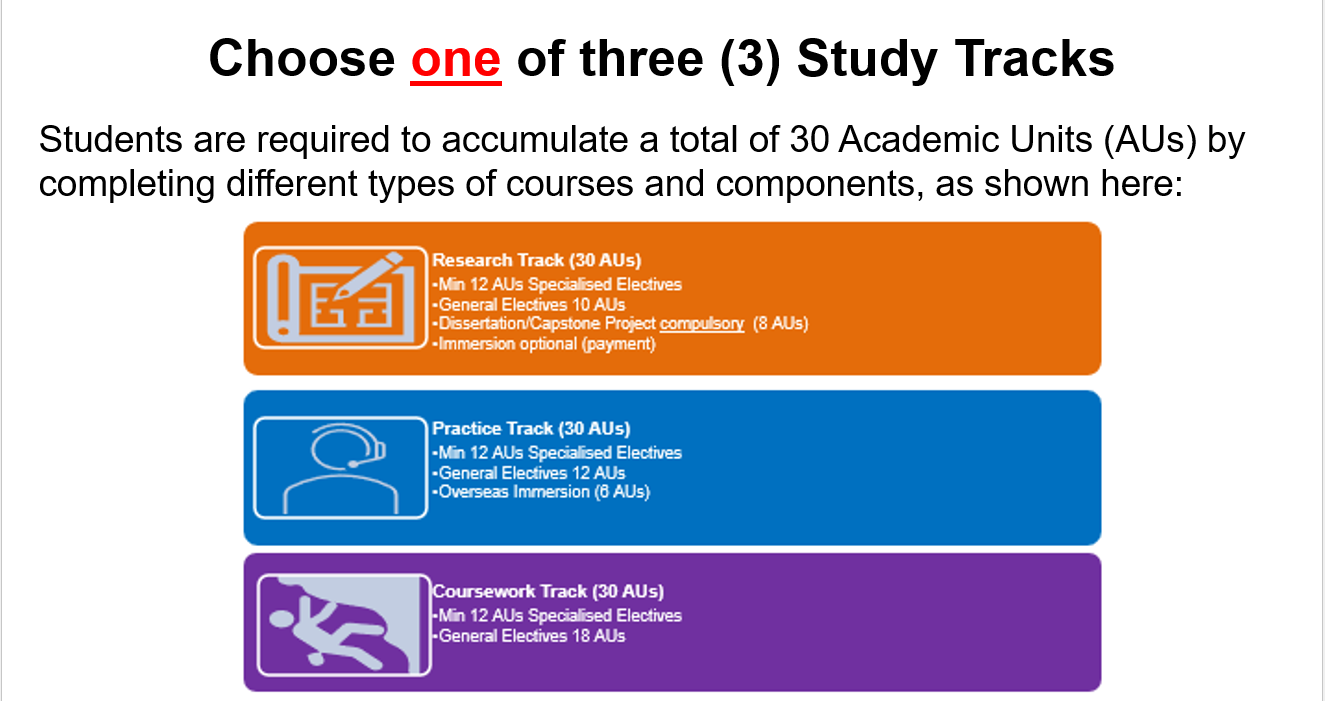Curriculum (New!)
The MTI Programme is a full-time programme specially with its curriculum specially designed to cater with advanced, up-to-date, broad-based knowledge with specific skillset in translating/interpreting.
Students can choose to complete the programme within the minimum candidature of 1 year to the maximum of 2 years.
Within the candidature given, students must choose one of the three study tracks and complete a minimum of 12 AUs from the category "Specialised Electives", with an option to do dissertation/capstone project or go for overseas immersion and remaining AUs from the "General Electives" category, as illustrated by the diagram below:

The specialised elective courses are centred on specialised translation and interpretation, systematically providing theoretical grounds and hands-on training for further education, research, and professional development. Group activities, individual assignments, and peer learning opportunities are also incorporated into the course design to help students to develop essential skills, such as critical thinking, self-reflection, and evaluation, so as to consolidate learning outcomes. In line with the interdisciplinary nature of translation studies, theories and key concepts relating to the central theme of each specialised course are also introduced, for students to have essential background knowledge and a better understanding of various professional contexts in order to foster their capabilities to conduct interdisciplinary research.
- TI6001 Translation Theories
- TI6003 Introduction to Interpretation
- TI6004 Translation Technology
- TI6005 Specialised Translation IV (Science, Technology and Medicine)
- TI6501 Texts in Context in Translation and Interpretation (New!)
- TI6502 AI, ChatGPT and Machine Translation (New!)
- TI6504 Contrastive Linguistics and Translation: English - Chinese (New!)
- TI6505 Research Methodology: Dissertation and Capstone Project (New!) *Compulsory for Research Track
Elective courses
- TI6002 Specialised Translation I (Literature)
- TI6102 Audiovisual Translation
- TI6207 Localisation and Translation Project Management
- TI6214 Interpreting in Practice (New!)
- TI6401 Literary Translation in the Singapore/Malaysian Context (New!)
- TI6402 Translation and Mainland Chinese Literature (New!)
- TI6503 Translation: Journalism and New Media (New!)
For Practice Track only (Immersion courses)
For Research Track only
TI6303 Dissertation or Capstone Project














/enri-thumbnails/careeropportunities1f0caf1c-a12d-479c-be7c-3c04e085c617.tmb-mega-menu.jpg?Culture=en&sfvrsn=d7261e3b_1)

/cradle-thumbnails/research-capabilities1516d0ba63aa44f0b4ee77a8c05263b2.tmb-mega-menu.jpg?Culture=en&sfvrsn=1bc94f8_1)

7e6fdc03-9018-4d08-9a98-8a21acbc37ba.tmb-mega-menu.jpg?Culture=en&sfvrsn=7deaf618_1)
